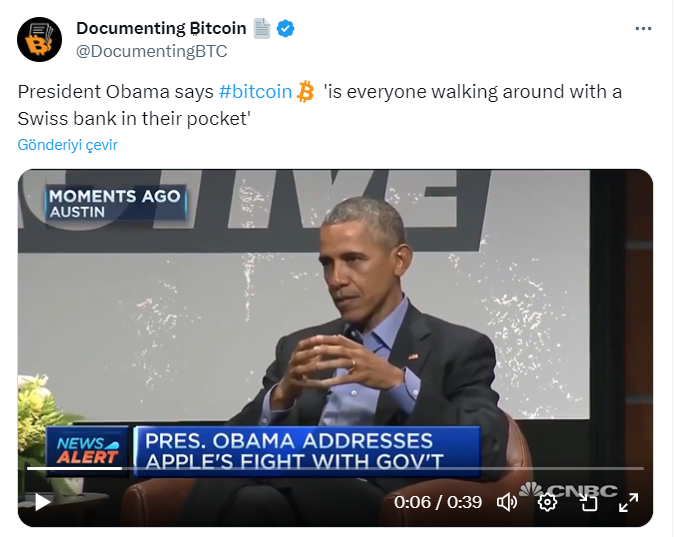Former US President Barack Obama recently made a statement that likened Bitcoin to “having a Swiss bank in everyone’s pocket,” which caused a significant stir. This comparison succinctly captures the essence of Bitcoin’s allure and its transformative potential in the financial landscape. Let’s delve deeper into this insightful analogy and explore its implications for the future of money.
Barack Obama’s Statement on Bitcoin
Obama’s analogy underscores the revolutionary nature of Bitcoin as a decentralized cryptocurrency. Bitcoin, akin to a Swiss bank account, offers privacy, security, and control over one’s assets, empowering individuals with an unprecedented level of financial autonomy.
With Bitcoin, everyone can transact globally without the need for intermediaries or central authorities, reflecting the freedom traditionally associated with Swiss banking secrecy.

However, while Bitcoin shares similarities with a Swiss bank account, it also diverges in significant ways. Unlike traditional banking systems that rely on trust in central institutions, Bitcoin operates on a trustless Blockchain technology. This means transactions are verified and recorded by a decentralized network of nodes, eliminating the need for third-party trust and reducing the risk of censorship or manipulation.
Limited Supply
Furthermore, Bitcoin’s limited supply of 21 million coins distinguishes it from inflation-prone fiat currencies. This scarcity model, similar to gold or other precious metals, endows Bitcoin with a store of value, making it an attractive hedge against economic uncertainty and fiat currency devaluation.
Obama’s characterization of Bitcoin as “a Swiss bank in your pocket” also highlights Bitcoin’s accessibility and inclusiveness. While traditional Swiss bank accounts are often associated with the wealthy elite, Bitcoin is borderless and can be used by anyone with an internet connection. This democratization of finance has the potential to empower individuals worldwide, especially those underserved or excluded by traditional banking systems.
A World of Challenges
Despite its revolutionary potential, Bitcoin still faces skepticism and regulatory challenges. Concerns about its use in illegal activities, volatility, and environmental impact persist, leading to calls for more oversight and regulation. However, Bitcoin advocates argue that its transparency and pseudonymous nature make it less susceptible to illegal activities compared to cash or traditional banking systems.
As governments and financial institutions grapple with the rise of cryptocurrencies, Obama’s analogy serves as a poignant reminder of the disruptive power inherent in Bitcoin’s decentralized ethos. Whether Bitcoin becomes a mainstream alternative to fiat currencies or remains a niche asset class, its impact on the future of money is undeniable.
In conclusion, President Obama’s analogy of Bitcoin as “having a Swiss bank in everyone’s pocket” succinctly summarizes Bitcoin’s disruptive potential. Combining the privacy, security, and accessibility of a Swiss bank account with the decentralization and transparency of Blockchain technology, Bitcoin represents a paradigm shift in how we perceive and interact with money. As the world continues to grapple with the consequences of this digital revolution, one thing is clear: Bitcoin is here to stay and will reshape the financial landscape for future generations.









